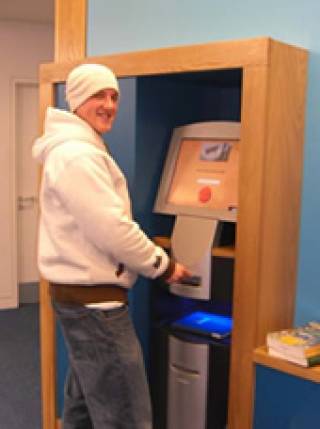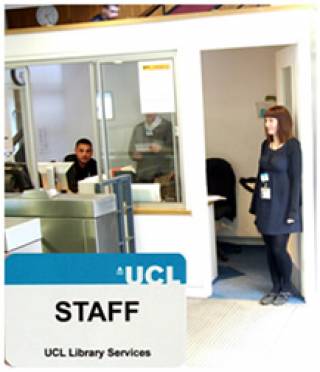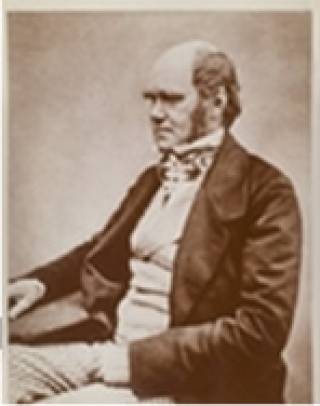Services
Service developments
September 2008 saw the unveiling of a groundbreaking service development in the UCL Science Library with the launch of self-service loans and returns facilities. The system is based on RFID (Radio Frequency Identification) technology, and required the Library to spend the previous summer preparing approximately 250,000 items of stock and installing self-service booths as part of the ground floor re-development. The aims for the service include: offering users the convenience of borrowing several books in a single transaction and allowing lending services to run during times of staff absence. Since the launch, the Library has consistently seen a minimum of 80% of loans transacted via the self-service facilities. 62% of respondents to a survey conducted shortly after the launch rated the new system as excellent, with further feedback suggesting they find it intuitive and reliable.

The new self-service system in action
Many of the developments at the biomedical site libraries focused on joint working with NHS partners. In particular, the Library Service Level Agreement between UCL and eight NHS Trusts was revised, and renewed for the year April 2009-March 2010. Staff continued their input into the development of the NHS Library Quality Assurance Framework, which will be used throughout England by NHS-funded library services from April 2010. In addition, several of these libraries contributed bibliometrics support towards the successful bid by UCL Partners to become one of five Department of Health-designated academic health science centres in England.
The Friends of the Children of Great Ormond Street Library at the UCL Institute of Child Health became a part of UCL Library Services on 1 January 2009. The Library jointly serves the Hospital and Institute, an internationally renowned centre for treating and researching childhood illness, and training specialists. The Library also houses the SOURCE Collection of material relating to international child health - much of it unpublished and not readily available elsewhere - that supports both postgraduate courses at the Institute and grassroots workers in developing countries.
The UCL Eastman Dental Institute Library migrated to Aleph, the Library's online library management system, for the start of the academic year in 2008, thereby enabling staff and students to search across the Eastman and other UCL collections together. RFID (Radio Frequency Identification) was introduced in the Library at the same time, allowing self-issue and return of book loans. The Library at the UCL Institute of Child Health also migrated to Aleph, later in the academic year.

Attendants on duty at the entrance to the UCL Science Library
Collections to support STEPS (Service Training and Education for Staff) were established at the Royal Free Medical Library, UCL Library Services and at the UCL Ear Institute Library. The subjects covered include management, administration and ethics.
The Attendants are vital to the smooth running of the Library, especially the UCL Main and Science Libraries where their responsibilities include opening and closing the buildings, undertaking security patrols, and sorting out maintenance issues. When on duty at the entrances to these libraries, their main tasks are to provide directional and basic service information and to deal with any security alarms. It is very important that they can be readily identified, whether at the library entrance or on patrol elsewhere in the building, and all Attendants now wear badges in order to ensure this.
Service enhancements
The Library@Engineering Café is an initiative of the Science Subject team, which is experimenting with bringing the services offered by the Library out to departments, with a series of regular drop-in sessions in the Engineering Café. The café is based on the ground floor of the Engineering Front building and has a high footfall of students passing through between lectures. The team took advantage of this to set up a regular lunchtime stall offering help with a range of library enquiries, and many of those using the service also provided feedback on the Library in general. The staff involved welcomed the opportunity to gain experience in running this type of service, which will be repeated in the busy Autumn term.
2008-2009 saw the UCL Language & Speech Sciences Library opening on Saturdays for the first time, in term and Easter vacation, from 11:00 to 18:00, plus evening opening until 19:00 Monday-Friday all year. This has been very popular with both UCL staff and students and external users. Opening hours at the UCL Institute of Orthopaedics Library were also extended, to 19:00 on Tuesdays and Thursdays.
Other service enhancements at biomedical site libraries include the expansion of IT services for NHS staff at the UCL Ear Institute Library, with the provision of more computers, and the introduction of the RoamNet service at the UCL Institute of Orthopaedics Library.
Enhancing digital access
UCL has taken the lead in mandating an Open Access policy whereby, subject to copyright requirements, all UCL research output is to be made freely available via the UCL Discovery online repository. This will allow UCL authors, including PhD students, to reach as wide a readership as possible and so enhance the impact of their research. Implementation of the policy is being overseen by the UCL Publications Board. Further details are given in the June 2009 Press Release.
UCL Archives, the online database of archive holdings for UCL Special Collections and the UCL School of Slavonic and East European Studies, was launched in February 2009. For the first time it is possible to search remotely 14,000 descriptions for UCL Special Collections, and over 750 descriptions for UCL SSEES and to explore at file level the catalogues of major collections including George Orwell, Francis Galton, Edwin Chadwick and Lionel Penrose.
Two more blogs have been started. One, like those that began last year, is subject specific. The other, the Electronic Resources blog,
provides information about the ejournals, databases and ebooks
available to members of UCL. It also includes details of trial access to
resources that have been recommended and invites feedback that can be
very helpful when deciding whether to pay for continuing access.
Digital resources
UCL joined EThOS, the Electronic Theses Online Service, in January 2009. This service is run by the British Library, with the aim of offering a single point of access to all theses produced by UK Universities. The majority of theses from participating institutions are available via this service, though there may be a short delay if the thesis has not yet been digitised (and in some cases a fee to pay).
In a related development, undergraduate student dissertations in speech science are now available in digital format only. This has enabled significant space savings in the UCL Language and Speech Sciences Library. Individual theses can be located via the Library catalogue, with a link to the relevant departmental web page.
Exhibitions

Photograph, from the exhibition, of Charles Darwin in the 1850s
Charles Darwin of Gower Street (September 2008 - April 2009)
The Exhibitions Group marked the Darwin200 celebrations with a display of materials from UCL Special Collections illustrating his life and work and the influence of his ideas about inheritance and evolution on his contemporaries and successors, including eminent UCL people. Exhibits, including a first edition of On the origin of species, were drawn from the personal libraries and papers, held by the Library, of Sir Francis Galton and Karl Pearson.
The exhibition was opened by Professor Steve Jones and attracted considerable attention. Library staff recorded a UCL news podcast about it in October 2008, available through UCL on iTunes U. The online catalogue accompanying the exhibition has been one of the most downloaded items from the Digital Collections repository.
Books and beyond: diversity in our collections (June - December 2009)
The Summer exhibition for the UCL Main Library staircase represented the variety of form and content in the Library collections. Items included banknotes from pre-Soviet Russia, birthday tributes to the late Sir Stewart Duke-Elder, fine illustrations from natural history archives, a lost Byron manuscript rediscovered by the Library's Rare Books Librarian, and Huygens' Systema Saturnium recording the discovery of Saturn's ring in 1659. Excavation photographs from the UCL Petrie Museum were displayed alongside the Library book that describes them. Toys and other items that have a special role in the training and work of speech therapists featured too, as well as sustainable architecture, and experimental music as an art form.
Rare material held at UCL School of Slavonic & East European Studies Library
The digitisation of content from the UCL SSEES Library holdings of early travel writing and maps for EuropeanaTravel was complemented by two exhibitions during the year. One was in connection with a Hungarian Studies Day, and the other coincided with the Russian Archives Training Sessions held at UCL SSEES in November.
 Close
Close

